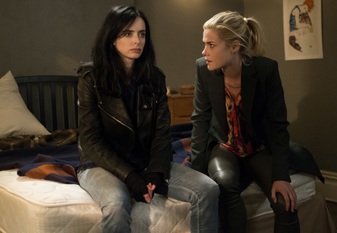Written by Kate McHargueTHIS IS THE EMERGENCY SPOILER ALERT SYSTEM...YOU ARE ADVISED TO READ AT YOUR OWN RISK... I have said this before and I will say it again, Marvel’s Netflix Original Jessica Jones is a feminist manifesto. There are female characters with important story arcs and active speaking roles, there is diversity in the types of women who are cast and portrayed, female sexuality is not demonized or objectified but celebrated and encouraged, and best of all, the female protagonist escapes an abusive relationship and saves numerous others from suffering the same abuse at the hands of a villain who embodies everything terrifying about a manipulative abuser. I could go on and on about the ways in which Jessica Jones ushers in a new and much needed dialogue about female empowerment in Superhero narratives. And I probably will in future posts. For now though, I want to focus on the moment where all of this cumulative feminist awesomeness reaches its peak. From the first episode to the last, the most powerful and complex relationship in the show is between Jessica Jones and her longtime friend Trish Walker. At first glance, these are two very different women with seemingly nothing in common. Jessica is an aggressive, abrasive, lone wolf alcoholic who lives and works out of grungy apartment in one of the rougher neighborhoods in New York. Trish is a child star turned radio celebrity with a personal trainer and a penthouse apartment on the Upper East Side. At first glance it seems like this is a cliché opposite sides of the tracks relationship. As the series progresses, however, we come to see that both women are more than they portray and it is in these hidden parts of themselves that they form their close bond. Jessica may act tough and insist she doesn’t need or want anyone’s help, but we see how deeply she cares for the people in her life and how dedicated she is to protecting those who can’t protect themselves. Trish seems pampered and perhaps a little naïve but she struggles daily with the memory of her abusive childhood and is fearless in her confrontation of injustice. It is in each other that Jessica and Trish find what everyone is searching for, safety and support. Jessica Jones may be the hero of this story but it’s Trish who pushes her to greatness and is quite literally by her side when she finally faces her demon. The series reaches a fever pitch of feminist themes in its climactic final episode, when Jessica and Kilgrave face off one last time. The sinister evil of Kilgrave reaches new lows when he threatens to steal Trish away and force her to live as his sex slave, the same fate Jessica endured at his hands. We see Jessica’s terror as she realizes she could lose the one person she’d give anything to protect and our hearts break for her. Trish is more than just Jessica’s friend, the two of them are family. This bond is ultimately the downfall of Kilgrave and his abusive reign of terror. When Kilgrave demands that Jessica stop fighting, she does. When he orders her to smile, she does. When he commands her to tell him she loves him, she stops the charade and turns to Trish and tells her, “I love you.” And then she snaps Kilgrave’s neck. In one shining moment of karmic comeuppance and female friendship, Jessica Jones and Trish Walker prove that women are stronger together. Jessica on her own is a total badass and Trish by herself is absolutely fierce, but the two of them together are unstoppable. The TV series as a whole may be destabilizing the patriarchy, but Jessica and Trish are the ones swinging the metaphorical sledge hammer.
0 Comments
Leave a Reply. |
Archives
March 2025
|
|
© 2012-2025, Nerds That Geek LLC.
All Rights Reserved. |
uWeb Hosting by FatCow

 RSS Feed
RSS Feed